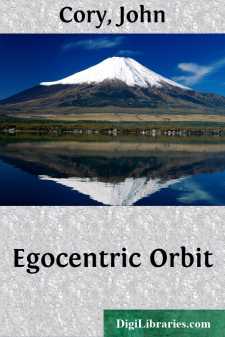Categories
- Antiques & Collectibles 13
- Architecture 36
- Art 48
- Bibles 22
- Biography & Autobiography 813
- Body, Mind & Spirit 142
- Business & Economics 28
- Children's Books 17
- Children's Fiction 14
- Computers 4
- Cooking 94
- Crafts & Hobbies 4
- Drama 346
- Education 46
- Family & Relationships 57
- Fiction 11829
- Games 19
- Gardening 17
- Health & Fitness 34
- History 1377
- House & Home 1
- Humor 147
- Juvenile Fiction 1873
- Juvenile Nonfiction 202
- Language Arts & Disciplines 88
- Law 16
- Literary Collections 686
- Literary Criticism 179
- Mathematics 13
- Medical 41
- Music 40
- Nature 179
- Non-Classifiable 1768
- Performing Arts 7
- Periodicals 1453
- Philosophy 64
- Photography 2
- Poetry 896
- Political Science 203
- Psychology 42
- Reference 154
- Religion 513
- Science 126
- Self-Help 84
- Social Science 81
- Sports & Recreation 34
- Study Aids 3
- Technology & Engineering 59
- Transportation 23
- Travel 463
- True Crime 29
Egocentric Orbit
by: John Cory
Categories:
Description:
Excerpt
ear the end of his fifteenth orbit as Greenland slipped by noiselessly below, he made the routine measurements that tested the operation of his space capsule and checked the automatic instruments which would transmit their stored data to Earth on his next pass over Control. Everything normal; all mechanical devices were operating perfectly.
This information didn't surprise him, in fact, he really didn't even think about it. The previous orbits and the long simulated flights on Earth during training had made such checks routine and perfect results expected. The capsules were developed by exhaustive testing both on the ground and as empty satellites before entrusting them to carry animals and then the first human.
He returned to contemplation of the panorama passing below and above, although as he noted idly, above and below had lost some of their usual meaning. Since his capsule, like all heavenly bodies, was stable in position with respect to the entire universe and, thanks to Sir Isaac Newton and his laws, never changed, the Earth and the stars alternated over his head during each orbit. "Up" now meant whatever was in the direction of his head. He remembered that even during his initial orbit when the Earth first appeared overhead he accepted the fact as normal. He wondered if the other two had accepted it as easily.
For there had been two men hurled into orbit before he ventured into space. Two others who had also passed the rigorous three-year training period and were selected on the basis of over-all performance to precede him. He had known them both well and wondered again what had happened on their flights. Of course, they had both returned, depending upon what your definition of return was. The capsules in which they had ventured beyond Earth had returned them living. But this was to be expected, for even the considerable hazards of descent through the atmosphere and the terrible heating which occurred were successfully surmounted by the capsule.
Naturally, it had not been expected that the satellites would have to be brought down by command from the ground. But this, too, was part of the careful planning—radio control of the retro-rockets that move the satellite out of orbit by reducing its velocity. Of course, ground control was to be used only if the astronaut failed to ignite the retro-rockets himself. He remembered everyone's surprise and relief when the first capsule was recovered and its occupant found to be alive. They had assumed that in spite of all precautions he was dead because he had not fired the rockets on the fiftieth orbit and it was necessary to bring him down on the sixty-fifth.
Recovery alive only partially solved the mystery, for the rescuers and all others were met by a haughty, stony silence from the occupant. Batteries of tests confirmed an early diagnosis: complete and utter withdrawal; absolute refusal to communicate. Therapy was unsuccessful.
The second attempt was similar in most respects, except that command return was made on the thirty-first orbit after the astronaut's failure to de-orbit at the end of the thirtieth. His incoherent babble of moons, stars, and worlds was no more helpful than the first.
Test after test confirmed that no obvious organic damage had been incurred by exposure outside of the Earth's protective atmosphere. Biopsy of even selected brain tissues seemed to show that microscopic cellular changes due to prolonged weightlessness or primary cosmic-ray bombardment, which had been suggested by some authorities, were unimportant....


